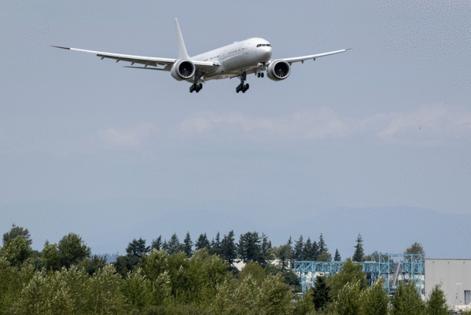Boeing turns cash flow positive, but delays 777X with $4.9 billion charge
Published in Business News
For the first quarter since a midair blowout in January 2024, Boeing generated more cash than it spent, marking a significant financial milestone on its path to recovery.
But the aerospace manufacturer is still struggling with long-delayed airplane programs, including two Max variants and its 777X family.
On Wednesday, Boeing said it took a $4.9 billion charge on its 777X program in the third quarter and delayed the first 777-9 delivery to 2027.
“While we’re all disappointed with the 777X delays, it shouldn’t overshadow the progress we’re making,” CEO Kelly Ortberg told analysts on a call Wednesday morning. “Our customers are giving us great feedback. … We’re increasing production rate. We turned cash positive in the quarter, and we’re winning in the market.”
Boeing lost $4.8 billion from operations in the third quarter, which runs from July through September, compared to a loss of $5.8 billion in the same three months last year. It had a net loss of $5.3 billion, or a loss of $7.14 per share, compared to a net loss of $6.2 billion, or a loss of $9.97 per share in the third quarter of 2024.
Boeing’s revenue increased in the third quarter year over year, from $17.8 billion last year to $23.3 billion this year.
It reported free cash flow of $238 million, marking the first quarter with positive cash flow since the end of 2023. By comparison, in the same three months last year, Boeing reported negative free cash flow of $1.9 billion as it struggled to recover from the panel blowout and faced a Machinists strike that halted production at its Puget Sound factories for nearly two months.
The upturn this year is due to increased production of its commercial planes, Boeing executives said Wednesday.
In the third quarter, Boeing’s commercial airplanes business generated $11 billion in revenue, up from $7.4 billion in the same quarter last year.
Boeing delivered 440 commercial airplanes in the first nine months of this year, nearly 100 more than it delivered all of 2024. It also recorded 774 orders through September, more than double its orders from the same time last year.
Analysts have attributed some of that surge in orders to President Donald Trump’s trade negotiations, with countries placing large aircraft orders to possibly curry favor with the U.S. administration.
Earlier this month, the FAA lifted a production cap on Boeing’s 737 Max that has been in place since the midair panel blowout last year. Ortberg told analysts Wednesday that Boeing is already producing at a higher rate, rolling out 42 Max planes per month.
Boeing is working through a similar process with the FAA to increase production of its 787 Dreamliner in South Carolina, and expects to roll out eight per month “in the near future,” Ortberg said.
On the 777X program, Ortberg said there are no new issues with the plane’s airframe or engine. Boeing completed testing this quarter on the airplane’s brakes, engines, takeoff performance and aerodynamic performance but it still has a “significant portion” of the certification program to work through, Ortberg said.
A new phased certification approach with the FAA is taking longer than expected, Boeing’s new Chief Financial Officer Jay Malave told analysts Wednesday. Boeing had anticipated moving to the next phase in the third quarter, but now expects it won’t do so until later this year or early 2026.
With the new charge in the third quarter, Boeing has now accumulated $15.9 billion in charges on its 777X program, according to analysts from Agency Partners.
“The market may be inclined to shrug off another charge,” particularly as it focuses on increased production for Boeing’s certified models, Agency Partners wrote in a note to analysts Wednesday. “But the scale of the charge reminds us that there may be other stings in the tail to come.”
The $4.9 billion charge from the 777X program increased Boeing’s loss per share in the third quarter by $6.45, Boeing said.
Boeing is also still working on a solution to an engine anti-ice issue on its yet-to-be-certified 737 Max 7 and 10 variants. It will have to make hardware and software modifications to its test aircraft, Ortberg told analysts. Boeing expects FAA certification for both Max variants in 2026.
Meanwhile, Boeing Global Services, which provides aftermarket support and other services for customers, generated $5.4 billion in revenue, compared to $4.9 billion last year.
Boeing’s defense business generated $6.9 billion, up from $5.5 billion in the third quarter last year. It increased deliveries by 24% compared to the first nine months of 2024.
Boeing defense workers in St. Louis have been on strike for nearly three months, but company executives said Wednesday the ongoing labor dispute has not had a material financial impact. The strike includes about 3,200 workers, and is much smaller in scale than the Puget Sound strike that included 33,000 employees last year.
Boeing beat its own estimates for the quarter in part because of higher-than-expected production rates, and because it did not make an expected payment to the Department of Justice to settle a criminal charge related to two fatal 737 Max crashes six years ago.
The$445 million charge that Boeing outlined in its estimates for this quarter was part of a deal struck between the DOJ and Boeing to resolve allegations that Boeing had misled safety regulators about a new feature on its Max plane. That software system led two planes to crash in 2018 and 2019, killing 346 people. The families who lost loved ones in those crashes have objected to the deal, arguing that it does not hold Boeing accountable.
The deal is still pending approval from a federal judge in Texas. It’s not clear when the charge would appear in Boeing’s financial results.
©2025 The Seattle Times. Visit seattletimes.com. Distributed by Tribune Content Agency, LLC.












Comments